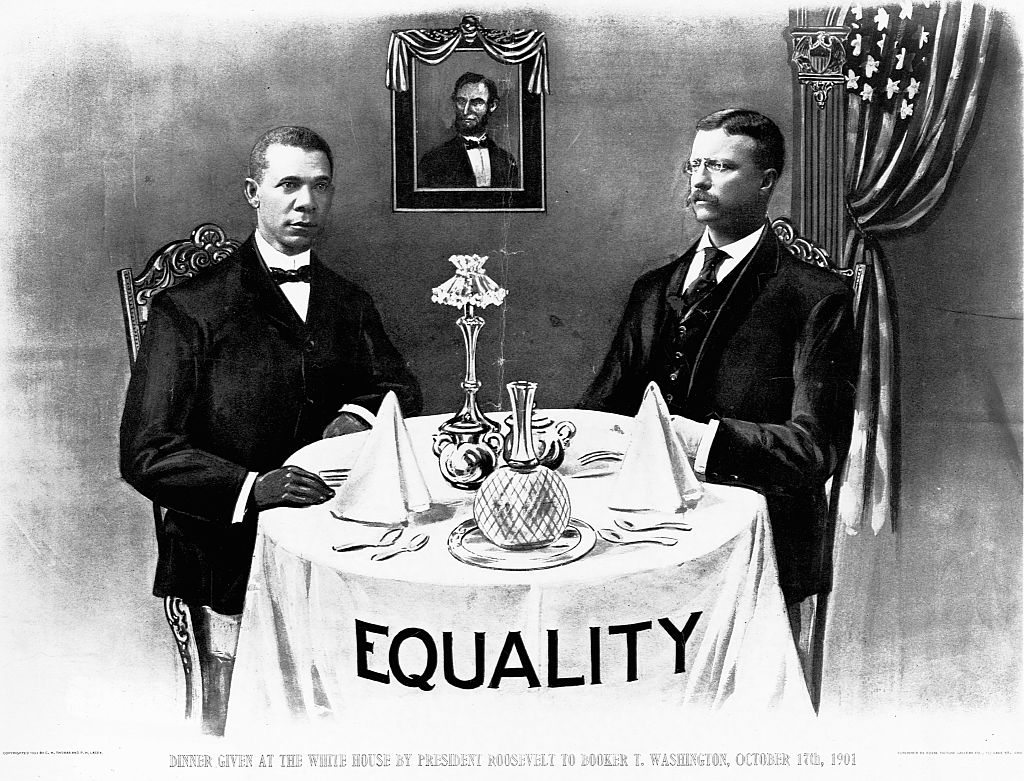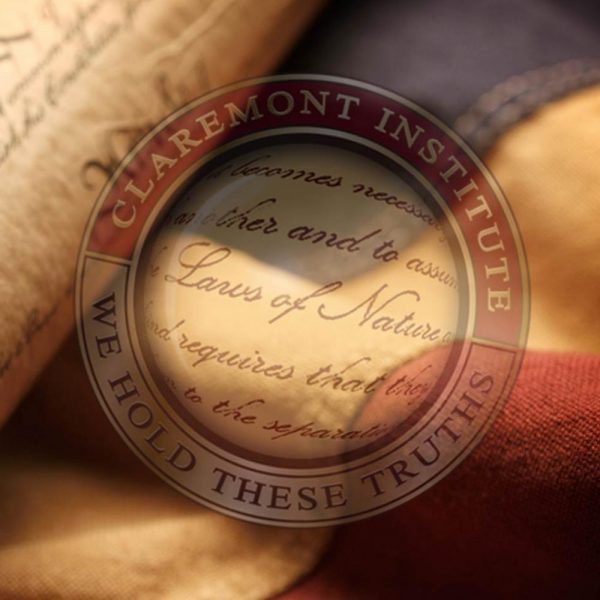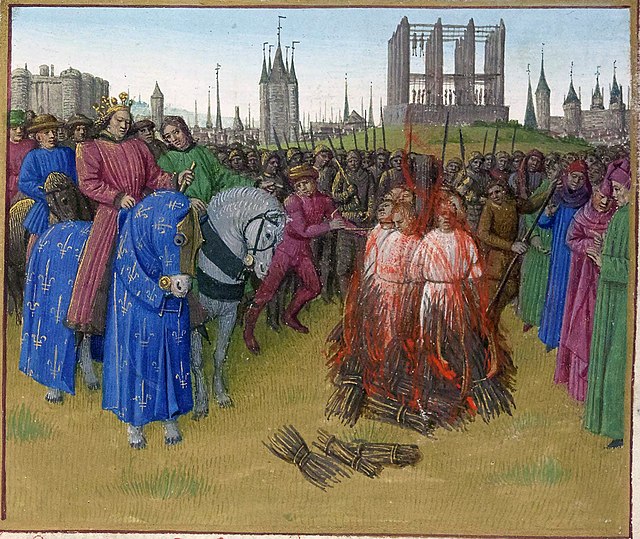A Statement from the Claremont Institute
Freedom from “Blackness”

Renouncing race is the answer to restoring our humanity.
The fabricated black race should never have been born. It was confected out of false biological taxonomies by Europeans to justify a system of human physical bondage that, paradoxically, brought black people into the historical process. It was a cruel, artificial construct, and blacks have suffered enough under it. If racist whites owe blacks a reparative moral gesture, it is this—terminate your need to see blacks as blacks and refrain from establishing societal configurations that require them to prove their blackness. It is life-denying for blacks to resort to an appeal to their blackness as a legitimizing referent from which to both interpret and make sense of their humanity
Blacks have internalized an identity that was created for them. There were no black people until the Europeans invented them. Why have blacks clung so tenaciously to an inherited identity that was foisted upon them—an identity manufactured to exclude them from the polis and the domain of the ethical? Autonomous, self-respecting persons do not proclaim racial pride when they originally had no race and were given an artificial one that eviscerated their dignity and self-esteem and, concomitantly, created conceptions of agency and personhood around those markers that branded them as biologically inferior and morally immature.
Many blacks have given up their sovereignty and autonomy in this respect. True, they have had no power to disambiguate themselves from what others with the powers to name them have chosen to call them. But too many of them have internalized this racial identity as something precious and wonderful—as a mark of who they are authentically. Not all blacks, it is true, hold to this self-hating form of identification. Many Caribbeans and Africans identify as black strategically, but internally, they refuse to hold a racial identity—one that forms part of their self-image. Values, beliefs, and character are what constitute identity, not race, which is a neutral characteristic that reveals nothing about the core content of a person’s moral agency.
Yet many blacks remain atavistic racial determinists in their psychological makeup; they are mawkish sentimentalists attached to a fetishized history that forged an identify for them in the crucibles of bondage. Their compromised imaginations simply cannot see where to go from here. The 1964 Civil Rights Act should have been accompanied by a twin consciousness: first, realizing that, by the “One-Drop Rule,” blacks marked as such would continue to be identified, and identify their grievances, accordingly; second, beginning the process of de-shackling themselves from an internal racial identity—the outward manifestation of which had been used as a legitimate insignia for legal persecution for centuries.
One wins a war of discrimination via several means, which include virtues based on one’s moral character. Not one of those virtues has a racial hue to them. In the name of a return to inviolable and inalienable individualism and self-respect, blacks ought to have made a vow to overthrow their inherited racial brand that has kept them tethered to a restricted agency. “In the name of an intransigent individualism, we, the most racialized people on earth,” blacks ought to have sworn, “will become a psychologically raceless people and open ourselves to the luminous potential of man and a new birth to the black individual as an individual.”
A taxonomy that makes human distinctions based not on cultural differences—which can objectively be defined as the set of dominant beliefs, customs, and traditions of a homogenized or non-homogenized group—but based on race, which none of the conceptual markers that allow us to predict or pick out any moral characteristic of a human being, is valorized by most blacks. The source of their oppression is thus worn fiercely as an honorific badge of racial authenticity. The white man called him Negro, black, nigger, colored—and he accepted it passively as his deserved birthmark. To cling to a strong racial identity is a form of tribalism that is born of a deep narcissism where one needs to see oneself as special because of one’s racial or ethnic identity.
We have weaned ourselves from our mothers’ breasts, but we have substituted for the breast the name of the tribe, the race, the ethnos, and the Volk. But for black Americans, there is no real tribe or Volk. There are only long gone, imagined communities in Africa from which they have long been alienated, and fantasies of an ancient Egyptian civilization none of them are tied to ancestrally. Any black person who has ever suffered for his racial identity—and subsequently held on to “blackness” as a source of honor—has never been proud, never experienced self-esteem, never known what it was “to keep it real,” never known genuine authenticity, autonomy, or sovereignty. Such persons have been the passive consumers of ready-made, secondhand identities tailor-made for them because they lacked the moral temerity to throw those identities in the faces of those who foisted them upon them and say, “We cannot refer to ourselves publicly any other way since the social reality you’ve created is so deeply entrenched, it almost operates with invariability, as do the laws of nature. But we will not internalize these identities as part of our self-identification. There is no pride in holding on to something you have used to oppress us. It is time for a race strike. No—it is time for us to be race traitors and make a new way.”
Race Treason
To understand the morality of being a race traitor and the moral good that accompanies being one, I need to pose the question—is it even moral to hold and practice a racial identity? In my analysis, holding a racial identity and the relinquishment of it is an act of radical freedom. It is to position oneself in the world as a metaphysical rebel. It is only then that we can explore the radically free metaphysical—the heroic, transracial race traitor who can usher in a new planetary ethic and give humanity an aspirational model on which to base his identity. What we shall call for is nothing short of the revocation of the black individual’s membership in a race he never asked to belong to. The final restitution of the raceless community shall reside within himself. His own self-enclosure contains multitudes and is, itself, a disclosure of possibilities that race restricts and constrains. This is because racial identification as a moral self-marker is primordial and atavistic. When someone admits that he is a “race man,” he is confessing his mummified state. He is bearing pride in being a hermetically sealed phenomenon, closed off from the world and from being affected by the encounters and exchanges with his fellow human beings. A “race man” is a deep misanthrope.
Holding a racial identity turns one into a practicing racist. White supremacists of all stripes, either of the North American variety or the Nazi counterpart, have given us ample evidence of the nefarious nature of strong racial identities, especially when they are wedded to a political ideology that demonizes racial/ethnic minorities such as blacks or Jews. I am, however, going to go much farther in the scope of my argument to suggest that the concept of race, in itself, is bad. The concomitant practice of holding a racial identity voluntarily and living one’s life as a racialized creature is a form of biological collectivism and racial subjectivism. It matters not whether one is black, white, Indian, or a member of any other designated group; the principle that binds all racial identities together—polylogism—is identical. To self-referentially hold a racial identity is to collude with a great social evil. This matters not if one is a member of a minority group (black) without the political means to institutionally discriminate on a large scale. It diminishes the scope of one’s sociopolitical reach, not the fundamental nature of who one is.
The race traitor is not just a lover of humanity. He corrects the empirically false beliefs that race consciousness generates about the moral and metaphysical status of individuals because of their racial identities. Racial identities/racial markers are conceptually ambitious in that they purport to convey information about persons that, if taken seriously on the conceptual level, would yield necessary and sufficient conditions that all persons falling under a racial category would satisfy. The extant literature on why race fails as a biological category is already well-established. What survives in the public imagination, however, are attributes that are taken to have moral salience, which are applicable to persons designated by historical and biologically fabricated markers.
Sociological studies on the formation of European-American ethnic identities reveal a broad swath of traits that Europeans (some later designated as white) held about other groups believed to belong to different races. These traits—ranging from productive, smart, God-fearing, clean, and efficient to lazy, dirty, cognitively immature and irredeemably evil, were allocated among the various groups of raciated individuals with those assigned the most negative traits falling the lowest on the prestige index.
Race and Caste
Throughout the history of racial classifications in the United States, to be black was to have the least prestigious identity. A morally salient factor about holding a racial identity is that one must engage in affected ignorance or willed self-deception about oneself and about others. In the face of competing evidence, one holds certain views about oneself and about others that are causally linked to a form of racial subjectivism. The latter holds, among other things, that certain attributes one deems praiseworthy are laudable because one has them, and one has them because those attributes are causally primed by having the racial identity one has. Whites, who hold a strong racial identity and predicate white superiority on advanced cognitive functioning that is treated as an irreducible primary because of its statistical consistency across a white population (especially when compared to the cognitive functioning of non-white populations), must engage in empirical obfuscation to maintain a psychologically consistent view of themselves over time.
Race and its forced imposition on a people are corporeal colonization. Wherein lies the pride? How can one be authentically proud to be something that was created in one as a negative and to consciously denote an absence of one’s humanity? Blacks, to this day, complain bitterly that their racial identities, which were imposed on them, are used by whites to hold them back in life as a source of discrimination. Yet, paradoxically, they proclaim love of that identity and cherish the source of the anguish they believe their oppression comes from. I believe black folks cannot continue to have it both ways. Black cultural depression is drawn at the fault line of this logical contradiction. Like a battered wife loving her abusive husband and justifying the love by pointing to the ways the abuses are proof of his responsiveness to her—therefore, she must be alive— blacks are in love—for all their protestations—with their abusers and the object of that abuse—racial identity. So low is collective black self-esteem that they continue to be the downtrodden legatees of a racial identity they internalize that (in their minds) penalizes their humanity to the core. Yet they protect its authenticity and purity as if it were something crafted by God himself and as if it were an immutable law of nature without which their lives would be compromised. Therefore, more than any other racialized group, black Americans are ideal candidates for racial self-emancipation. This will not mean that they will cease referring to themselves as black. The world at large, as I have said, has picked out morphological markers and racialized them. In a very real way, people of color are stuck with those designators. But they can cease identifying psychologically and morally with the burdensome evil of racial ascription and all the ways in which it circumscribes life. Black Americans may learn the process of decoupling their robust or even surface self-images and depth-identities from racial-inflicted, denigrating identities designed for them for myriad reasons.
The virtuous race traitor believes, like Charles Dickens, that the relief of human misery lies not in social revolution but in a transformation of the individual heart. The first transformative move is simply an initial iteration among several to follow. It is a propitious gesture meant to ameliorate—if not abolish—the internecine warfare of tribalism. Such a race traitor has never had the capacity to understand the pull of blood and of unchosen values in general. The attachment to ethnic/racial kinship and blood relations has always seemed like a form of delayed weaning from a protracted parental relationship. Behind that need is the demand for unconditional love, a love that does not have to be earned and maintained but is derived from mere membership in a bloody pool of ancestral relations.
He lives beyond and outside the tribal narratives that regulate the moral, personal, and existential lives of others. By this means, he knows he can truly love humanity. He knows that individual agency is a restoration of privacy and glory back to the individual where it properly belongs. Those whose lives might have been marred by, for example, the ravages of racial discrimination of Jim Crow segregationist laws, live far richer spiritual lives by practicing radical forgiveness towards those who oppressed them than they would by seeking retributive justice.
An obsession with justice and entitlement shackles the soul to the compensations of the one who has harmed one. A spirit of grievance, paradoxically, places one in a dependent role on the other. Radical forgiveness frees the soul from resentment and fosters an ethic of care towards those who have harmed one. It not only forges radically new relationships, but it also heralds a model for a new type of humanity, a new planetary ethic and humanism devoid of bitterness. Free and living in that space of radical love and forgiveness, the virtuous man or woman, holding no racial identity as his standard-bearer, stands confidently with palms facing the universe and declares to the world, “I have no history. I have no race. I have only you, and the future.”
The American Mind presents a range of perspectives. Views are writers’ own and do not necessarily represent those of The Claremont Institute.
The American Mind is a publication of the Claremont Institute, a non-profit 501(c)(3) organization, dedicated to restoring the principles of the American Founding to their rightful, preeminent authority in our national life. Interested in supporting our work? Gifts to the Claremont Institute are tax-deductible.
No future awaits those who rage against family, work, and community.
Conservatives and non-woke liberals must draw a line in the sand against racialized indoctrination.



